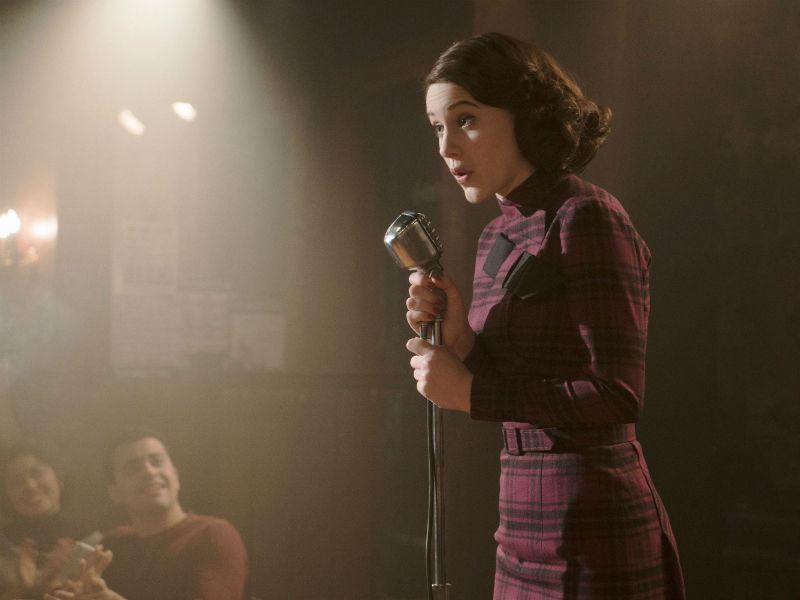I sat watching the recent Emmys with fingers and toes crossed, hoping for my favourite comedy to win, and it did – four times to be precise. If you haven’t seen The Marvelous Mrs. Maisel yet, get a subscription to Amazon Prime, because it’s worth it just for this show.
The comedy series is set in 1959 and follows the eponymous Mrs. Maisel as she accidentally becomes a standup comic in NYC following the break-up of her marriage. But the show is more than that. It’s a note-perfect depiction of upper-middle class life on the upper West Side. The art direction is lavish and the dialogue is conducted at breakneck speed. The lead, Rachel Brosnahan, is not Jewish, but captures the essence of a pampered 30-ish Jewish woman of the late ‘50s. She deserved her Emmy.
The show is one of a new breed of shows about standup comedy. Until recently, there have been no shows that tackled the topic, and the few movies that did made a mess of it, with the notable exception of Bob Fosse’s Lenny. Punchline (1988), which starred Tom Hanks and Sally Field, asked us to believe that comedy clubs have showers in the green room and that comics will deliberately flub their set so another, needier comic can win a big competition. There’s not a real moment in the film.
Adam Sandler’s Funny People (2009) and Obvious Child (2014) with Jenny Slate are better entries, but the comics are presented as neurotic and marginal, defined by their tics, not their personalities. Neither film gets it right.
But in the new world of television streaming, the depiction of comedians has become more real and fully-rounded. Mrs. Maisel is not the stereotype of the needy performer; in fact she stumbles into the job, getting up drunkenly at the Greenwich Village open mike she frequented with her ex-husband, a standup wannabe.
The manager of the club, a tough gay woman (who also turns out to be Jewish) insists Maisel come back, and practically forces her into becoming a professional. Their interplay is one of the highlights of the series. As she delves into the New York comedy scene, she befriends a young Lenny Bruce, which adds to the verisimilitude of the series.
The Marvelous Mrs. Maisel will enter its second season this fall. It’s yet uncertain whether another standup series, the Jim Carrey produced I’m Dying Up Here will get its chance for a third.
This Showtime series, airing here on The Movie Network, takes place in Los Angeles in the mid-’70s, ground zero for the comedy boom that brought David Letterman, Jay Leno, Elayne Boosler, Garry Shandling, and countless others to stardom. The show is based on a book by William Knoedelseder, but while the book details the exploits of these real comics, the show fictionalizes them, delivering composites that aren’t as interesting as the real people.
But the show, especially in its second season, gets under your skin. The club, called Goldie’s, is a credible duplicate for The Comedy Store, and its doyenne/owner, played to perfection by Melissa Leo, a perfect impression of the real life Mitzi Shore.
The comics are mostly played by actors, and one of the pleasures of the series is the high quality standup sets, all original material, delivered with skill by the characters. But those characters – Oy! Each one is a disaster in their own way. Arsonists, suicides, thieves, drug addicts – and that’s just the first show. I’m Dying Up Here takes the trope of the sad clown and inflates it to elephantine proportions. The narcissism of performers is a given, but the show veers too often into soap opera territory. A lot of comedians have a lot of problems, but sometimes they just wanna have fun, as the song goes.
More realistic, if less compelling, is Crashing, on HBO, now entering its third season. It takes place in comedy clubs in New York City set more or less in the present, and stars Pete Holmes as a struggling comedian in the city. Holmes is a standup, and I have to confess I never much cared for his work, which runs to the bland side. But the show turns his milquetoast personality into an asset, as he becomes the sane centre of a frequently insane world. In the show, he’s a practising Christian in a decidedly unspiritual world. His conflict with the nihilistic showbiz environment he’s in is the motor for a lot of the show’s laughter and tears.
The show mixes real comics with fake ones, with great guest spots by Sarah Silverman and Artie Lange, to name a few. The comedy scene here isn’t full of broken people, but hardworking career obsessives who are often mean and sometimes kind to Holmes, who plays a comic close to the bottom rung. It’s a good show with lots of laughs and some degree of sadness, but the pathos makes Holmes’ few victories more poignant.
READ: COMEDIAN FINDS HUMOUR IN LESSER-KNOWN JEWISH TRADITIONS
These shows are all a big step forward for the way standup comedy is depicted in the media. Maybe the next one will remember to include the fun.
